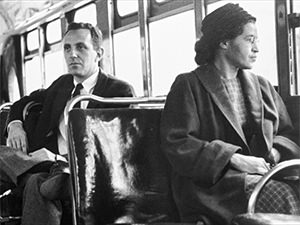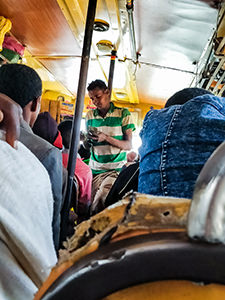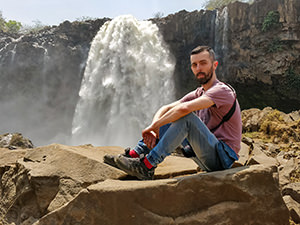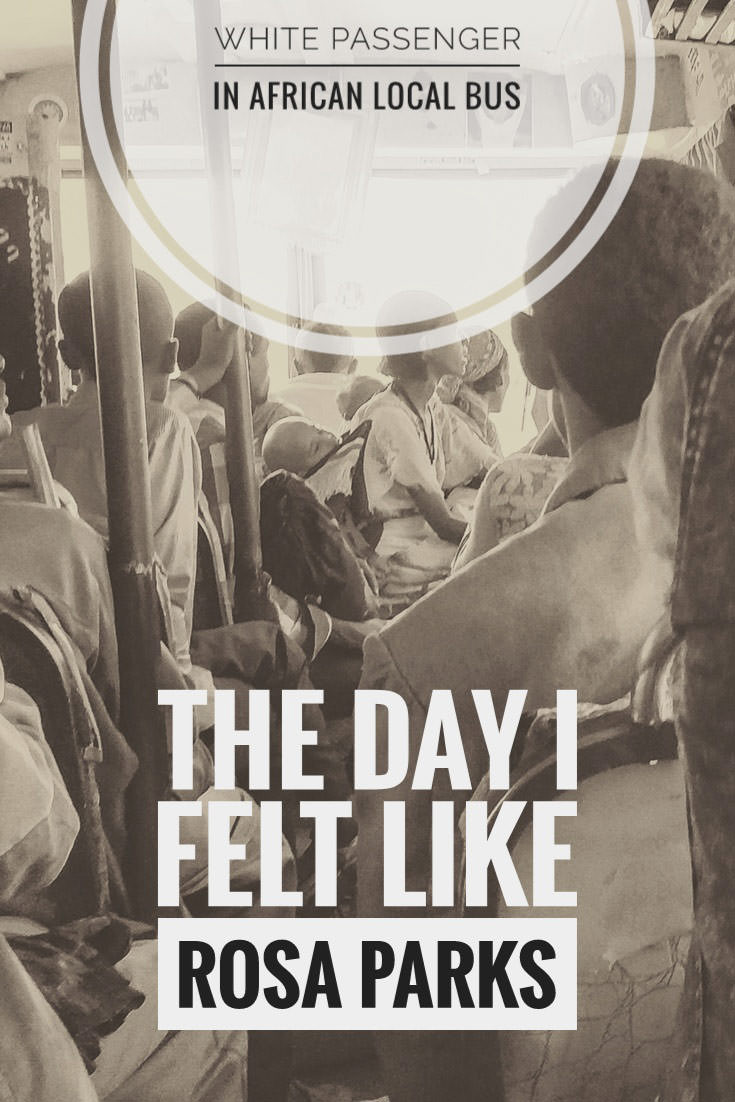Since I arrived in Ethiopia (at the time of writing, it’s been a couple of weeks), my thoughts have been occupied with the notion of racism. Every single day I’ve been reminded that I was mainly “a white person”. Even though I considered myself to be reasonably open-minded and try to fight back against prejudices, the set of various events started to build my distrust.
I am entirely aware that stereotypes aren’t based in reality, and that is why I am even more mad at the fact that my instinctive reactions have started to construct from a very similar racist idea – that all black people are the same. This, of course, is not my conclusion, but these first weeks in Ethiopia have taught me that if one persistently objectifies people, the space for personal connections becomes more and more limited. And that is probably how racism was born in the first place.
In 2018, in the local bus from Bahir Dar to Tis Abay, I felt like Rosa Parks.
Beggars and pickpockets of Addis Ababa
This story, however, began on the streets of Addis Ababa, the country’s capital. Stepping out of the hotel, I was seen as the personification of a rich wonder man, capable of solving all problems of poverty. Even those who were not sitting on the street corners begging for a coin, in the presence of my white face, would transform into beggars as well. Their expressions would become puppy-sad, and their arm would reach out in the hope of appealing to the human in me.
It was “us” and “them”. No shades of gray. Everything black and white
Children on the streets were rarely exchanging smiles with me. The typical Asian fascination with foreigners makes kids yell “Hello! Hello!” anywhere one goes. Here in Africa, I felt that my Ferenji appearance produced an equal interest, but the phrase to yell out often became “Money! Money!” or even “USD! USD!”.
In nine days in Addis, I was the target of pickpocketing attempts four times! The method usually looks like this: A couple or a group of pickpockets approaches you, offering a magazine to look at. While you become interested (Really?! Does that ever happen?), their hands operate under and around the magazine while they try to find the valuables in your pockets. They might as well look genuinely friendly, distracting your attention with high fives and other tactile interactions that disable your focus.
It seems my introductory article to Ethiopia on fear of Africa was more optimistic than this one is gonna be. I am sure my experience of this country will be evolving even further.
Protected compounds of solitude
The building of the EU Delegation in Addis was decorated with barbed wire. The compounds of foreign institutes turned out to be the isolated oases of calmness and preserved nature, the world on its own. I didn’t see many white people casually walking in the street. I could only conclude that expats here mainly lived in closed and secured bubbles, in which the exchange with the real surrounding world was minimal.
Ethiopia was technically never colonized, but the aftermath of colonization that never happened was evidently there. It was “us” and “them”. No shades of gray. Everything black and white. My European friends thought I was entering a continent of darkness and danger. On the other side, Africans thought that the white savior reduced to a walking wallet, had arrived. What have we done?

Hassle at the bus station
In Bahir Dar, the capital of the Amhara region, I’ve decided to visit Tis Abay, the village set around the Blue Nile Falls, some 35 kilometers away from the town.
Different guided tours could take you to this destination, as well as plenty that would bring you to the monastery islands of Tana Lake. But I’ve decided to go as the locals do. How hard could it be to hop on a local bus, ride for an hour, and walk to the Falls? Harder than one could imagine!
Already in the streets around the Central Bus Station, I was approached by touts asking if I wanted to go to Gondar, a town in the north. This only intensified when I entered the station grounds. I walked quite securely, knowing where I was going, but nothing could hide my white face shining under the African morning sun.
“Do you go to the Blue Nile?”, was just one of the question bombs that started to fall around me. I didn’t want to be rudely ignorant, so I replied that’s exactly where I am going. Then these two guys self-employed themselves as my guides to the bus (20-meter walk), always one step ahead of me, with an invisible ‘follow me’ sign blinking. “I can do it by myself”, I immediately tried to control possible later disappointments.
You have to pay now!
Local buses here leave when they are full of passengers. The next one to go was half full, so I entered to get a seat. My “guides” were surprised by my action: “Don’t you want to know the price of the ticket?”, they asked at the entrance door. “What is the price?”, I asked, while already on the bus. “75 Bir”, they greedily declared.
I wasn’t sure what the appropriate price would be for an hour or hour and a half of riding in the countryside dust. But I made myself clear that I planned to pay as soon as the bus left the station. The conductor walks through the bus and collects money once it starts moving.
“You have to pay now!”, one of these two guys raised his voice.
“It’s OK, I will pay when the bus starts. Just like everyone else!”, I replied.
This tricky deceiver did not like me playing smart. “YOU HAVE TO PAY NOW! I am the driver’s assistant!”
“What is the problem? I will pay once we start going!”
Should I stay or should I go?
They clearly did not intend to take no for an answer. It was the low season, and not many tourists wandered around here. I might have been their best available target that day.
“OK, leave the bus now! You go to the next bus!”, he started to yell, even pushing some local passengers in the direction of my seat.
It was half an hour of waiting for the bus to leave, and tensions only went up. Almost to the point where I thought this would end up being physical. I was even considering canceling the whole idea of visiting the Falls if this was something one needs to go through. Maybe even on my return journey?
The impostor screamed, while the vein on his neck just grew bigger and bigger in anger
Tactics of intimidation
These guys had no intentions to let my wallet go. “We are driver’s assistants! You need to pay us!”, the other seemed just slightly calmer. But he still pulled me by the shirt when wanted to address me.
“I am just a person, you know? The same as all the other people on this bus! Why are you bothering me?”, I asked, even if I knew this was due to my skin color.
“We are driver’s assistants! So you have to pay us!”, he did not show any sign of giving up.
The bus was filling up more and more. And I felt more and more protected by this human wall. However, none of these other poor locals spoke any English, so they could only sit quietly and watch how someone wanted to deny my right to sit on this bus. I was unsuccessfully trying to find compassionate eyes, someone who could possibly intervene, but those were just eyes full of fear. The conmen were successfully intimidating me and all the other passengers.
Hijacking a real driver’s assistant
When they figured out that I would be a hard walnut to crack, they even pulled the actual driver’s assistant into the bus and made him hold some fake piece of paper in the air, supposedly a 75 Bir ticket. “OK, he is the driver’s assistant. Now pay to him!”, the impostor screamed further, while the vein on his neck just grew bigger and bigger in anger.
At that moment, it became ridiculous. Is there anyone who would buy this story? Also, if this bus was driven by a driver who had no one, not two, but now I see – three assistants, should I even consider riding it?
Luckily, the arrested driver’s assistant (the real one) couldn’t hold a serious face in this play. He smiled at my eyes full of disbelief. I was one step closer to riding this damn bus!

80 percent discount
When the engine started, the feeling of relief was instant. I persisted in claiming my seat and was now riding towards Tis Abay. When the real driver’s assistant came by to collect the money, the ticket was 15 Bir. Five times less than what swindlers requested!
I was finally among normal people who only tried to live their daily life, as honestly as they could. The level of their poverty was appalling. I was sure they made a great effort to manage to afford even 15 Bir for a ticket. An old man in front of me had a cap that was full of holes and clearly was not so sun-protective. A young man sitting next to me was blowing his nose, and in the absence of paper tissues, he discretely pulled the bus curtains to the side and used them instead. Those curtains looked as if they had not been washed for years. And yet, this man used them and tried to keep his dignity as much as he could.
Hard work or opportunism?
At Blue Nile Falls, I engaged a local guide to join me. Abraham was a young geography student, and his fee for several hours of help was less than what the tricksters wanted for the fraud.
The difference between those who make an effort to make their lives better by honest work, and those who just try to live off of the other people’s work was obvious.
Those two fraudsters were exemplified cases of slave owners who came out of nowhere and declared their rules for personal gain. They would exploit any opportunity, the same way as predator birds would eat the dead prey. Luckily, that morning I made sure to show I was very much alive.

Rosa Parks, almost
I know Rosa Parks was a much braver person than me. When she was asked to move to the end of the bus with other persons of color, it was just a part of the injustice she was experiencing every day, every week, every year.
I endured the molesting for half an hour only (without even being arrested!), and therefore
I cannot relate entirely to the sad history of racial segregation and exploitation. But for that limited moment of intense harassment, I felt real compassion.
This is not to say that black people in Africa are now doing the same thing that white people were doing to blacks for centuries. It is to say that the consequences of racial practices always turn back to those who produce them.
Pavlov’s paranoia
I have no smart way to conclude this. The experience made me sad. Not because someone wanted to get easy money for hijacking a public bus ride. But because these exceptionally mean individuals, queuing with others of their kind, were efficiently closing my openness to others. I am not as friendly as I thought I was.
Every time someone approaches me now with “Where are you from?” or “Where do you go?”, I take a defensive move, become aware of my belongings, and am not relaxed. Sometimes, I even answer rudely. Sometimes these are people who genuinely just want to help.
I guess it has to do with the rules we learned from Pavlov’s dogs experiment. Constant reproduction of patterns can train our instinctive behavior. After enough repetitions, we will react at the whistle already. Ethiopian reality seemed to prove that the white men had been whistling too long, and the results of the experiment were there. They were not nice, and they were not promising. It made me utterly sad that my white face was blinding over here too often. Because of the skin pigment, we cannot see our true personas anymore. We are just actors in the fantasized universe of segregation. Can we unlearn our behavior?
Did you like this article?
Pin it for later!





What an experience!
Well, Ethiopia is a land of experiences 🙂